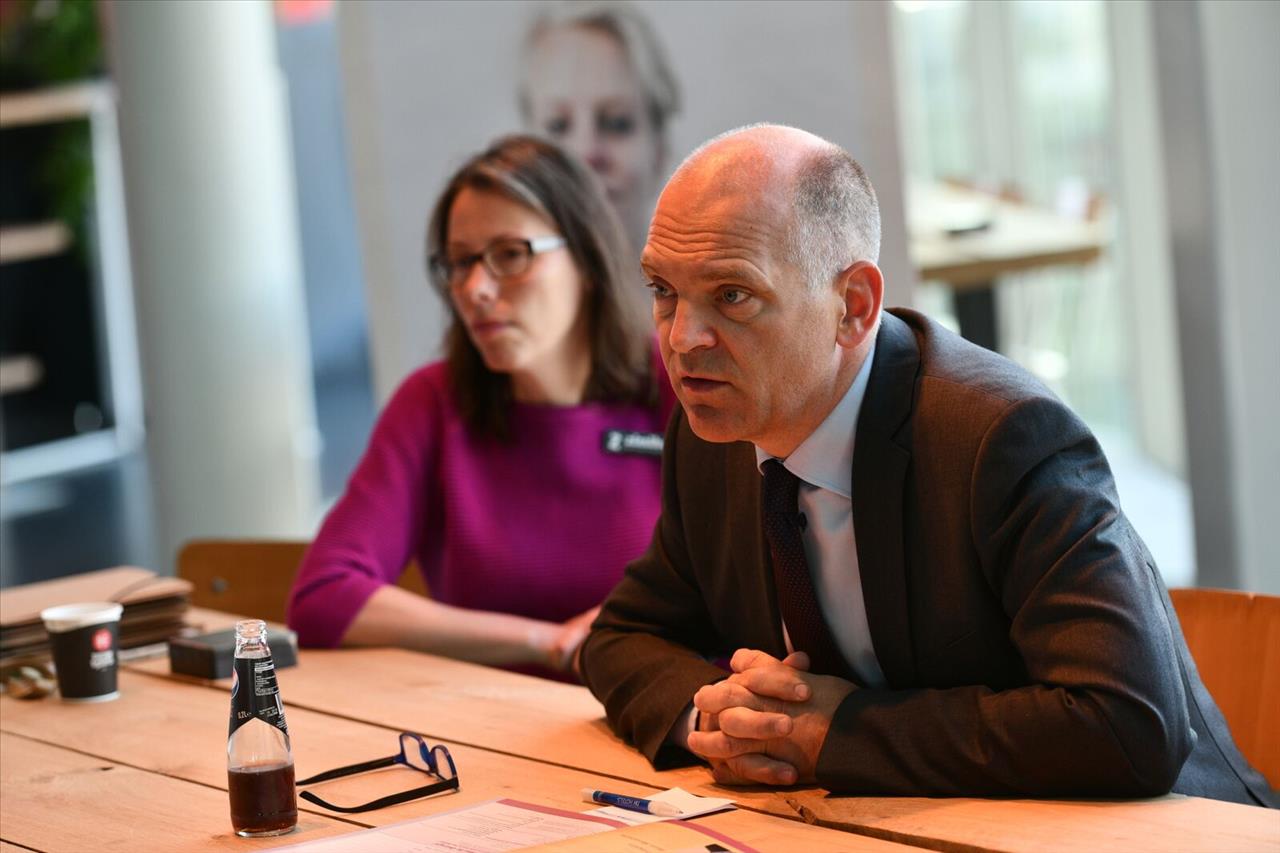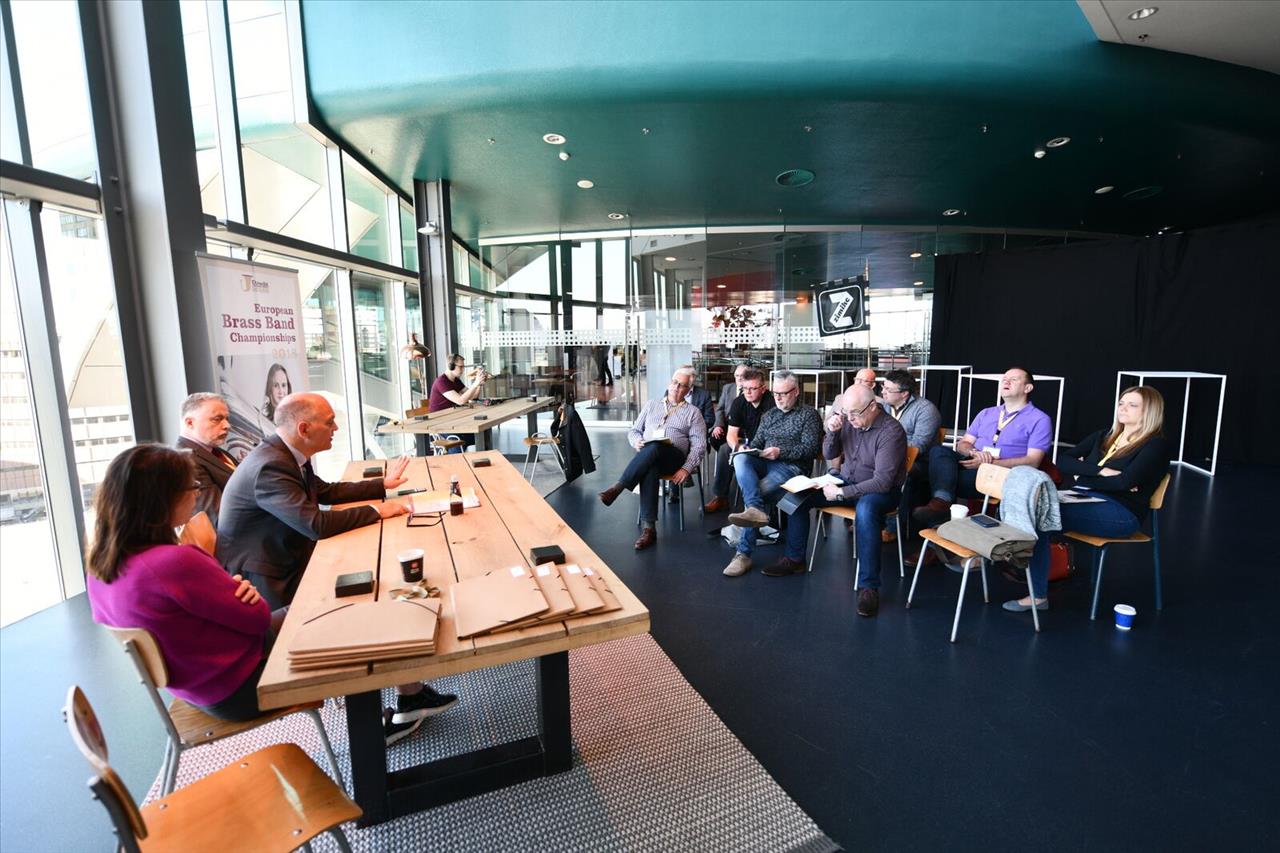
EBBA President Ulf Rosenberg responds...
Ulf Rosenberg, the European Brass Band Association President has made a robust defence of the organisation’s future aims as well as current budgeting reporting following 4BR’s recent ‘Article 50 dilemma’ feature by Editor Iwan Fox.
In response to the “interesting issues” raised, the Norwegian, who was elected to the post in 2007, also outlined his views on what he felt were points that were “unfortunately inaccurate”.
Banding’s Article 50 dilemma: Can EBBA stop further Euro Brexit decisions being made? https://www.4barsrest.com/articles/2018/1756.asp
Value feedback
In opening his correspondence to 4BR he stated: “The European Brass Band Association’s aim is to develop what is recognised as the world most prestigious band contest, the European Brass Band Championships.
In conducting that duty we greatly value the feedback, ideas and sometimes criticism from our stakeholders, the bands, players and audiences – and the press.
The editor of 4barsrest.com, Iwan Fox, raises some interesting issues in his recent article regarding a potential ‘Brexit’ stance among leading UK-based bands.
In order to clarify matters, the European Brass Band Association (EBBA) would like to take this opportunity to address some of his points, especially those that are unfortunately inaccurate.”
Scottish representation
He first addressed the question of Scottish representation at the 2019 event in Montreux.
“It is disappointing that Scotland will not be represented in the Championship Section of the 2019 European Brass Band Championships (EBBC), not least as a nation with a long and distinguished history at the event.
We recognise the financial challenges faced by all bands attending the EBBC, especially those that qualify on a regular basis like the current Scottish Champions, who have represented their country at over one third of all the events held since the EBBC was established in 1978.
It is disappointing that Scotland will not be represented in the Championship Section of the 2019 European Brass Band Championships (EBBC), not least as a nation with a long and distinguished history at the event.
We also look forward to welcoming representatives from Scotland back to future EBBC events, along with performers from developing brass band countries and our other 15 nations in membership, a number that we hope to increase with the addition of Spain, among others.”
Context
Ulf Rosenberg then places this in the context of the aims and ambitions of the EBBA.
“Since the formation of EBBA in 1995, it has been our responsibility to present our event in line with established objectives of best furthering and promoting the ‘intrinsic, aesthetic and social values of brass bands’ in Europe.
This inevitably means that the EBBC will be held in a variety of venues around Europe and we were pleased recently to be able to confirm the host cities for the years from 2019-23, which will see Europe’s finest brass bands compete for the first time in Palanga (Lithuania), Malmo (Sweden) and Innsbruck (Austria), in addition to the well-established brass band strongholds of Montreux (Switzerland) and Stavanger (Norway).”

EBBA answers questions from the press every year
Incorrect
The EBBA President then goes on to address what he sees as inaccuracies in the 4BR article.
“In addressing some of 4barsrest’s specific points, we would highlight that it is wholly incorrect to state that any of the financial income or brass instruments from sponsors of the EBBC goes to EBBA - 100 per cent of it goes to the bands through the awarding of prizes. And the prizes have increased the last years.
The management fee, paid each year by the local organisers, covers EBBA’s travel to the necessary milestone meetings and our presence at the events themselves.
The so-called EBBA bureaucracy doesn’t exist.
Member countries’ membership and participants’ fees plus income from the recording rights goes to the running of EBBA, covering activities such as sourcing new host cities, negotiating and managing sponsorship contracts and attending board meetings.
Other than a small payment to our dedicated General Secretary, no one on the EBBA Executive Committee or Music Commission receives any payment beyond travel and other expenses directly relating to the organisational work in presenting either current or future European Championships.
The so-called EBBA bureaucracy doesn’t exist.”
Challenging concept
In specifically looking at the question of the potential to appoint a Chief Executive Office or Commercial Manager for the organisation, Ulf Rosenberg wonders whether it would be cost effective.
He went on to state: “Recruiting a Chief Executive Officer, as 4barsrest suggests for EBBA, would potentially be an important addition to the continuity and quality of the EBBA work, but could also be a drain on finances.
The present model, with a President and Executive Committee accountable to delegates from member countries is cost effective and democratic, with the primary focus of resources directed to the bands, players and the audiences.
The present model, with a President and Executive Committee accountable to delegates from member countries is cost effective and democratic, with the primary focus of resources directed to the bands, players and the audiences.
Due to a challenging concept, i.e. staging a week-long event in a different country each year, EBBA needs to support, supervise and monitor the work of local organisers closely, and this sometimes requires a number of visits to achieve the high standards for which the EBBC has become renowned.
In 2016, we made a high number of visits than normal to guarantee the staging of a wonderful festival with the new and inexperienced hosts in Lille, France.
An established venue and organisation such as the Swiss in Montreux requires far fewer trips (only one from the full Executive Committee, not the four quoted by 4barsrest).
However, meetings held during the Swiss Nationals demonstrated the need to continue working closely with even the highly experienced organisers there to ensure that the necessary arrangements for 2019 are all in place.”

The financial risk of hosting the championships is with the hosts...
Healthy
However, despite his obvious disappointment that the potential hosting of the EBBC in Wales in 2020 fell though, and in admitting that the “financial risk” in hosting the event “lies with the local organisers”, he was keen to point out that interest in hosting the Championships in his words, “remains healthy”.
He added: “Losses in recent years are mainly associated with the planning for all events up to 2023, which are now settled.
There has also been the additional cost of four trips to Wales, which had shown a strong interest in hosting the EBBC in 2020, the outcome of which was disappointing in the end.
The financial risk in hosting the EBBC ultimately lies with the local organisers, some of whom rely largely on ticket sales.
This has been an attractive option in itself, with the main contest and gala concert selling out very quickly, often within hours, every year since 2008.
The financial risk in hosting the EBBC ultimately lies with the local organisers, some of whom rely largely on ticket sales.
Lille, Utrecht, Palanga and Malmo are among those fortunate enough to have extensive support from local authorities, which certainly relieves a lot of pressure for the local organisers, but even with the wide variation in support experienced across Europe, we are pleased to report that interest in hosting the EBBC beyond 2023 remains healthy.”

The noughts in the budget finances were helped by local authority help in Utrecht
Not hampered
Ulf Rosenberg is aware however that costs are increasing – although he states that “none of this is hampered by bureaucracy”, and that the organisation is keen to increase its income streams.
He wrote: “EBBA’s Executive Committee is acutely aware of increasing costs and works diligently to keep its own running costs as low as possible.
Opportunities to save costs is always high on the agenda given the constant rise in hotel and travel costs.
It may be necessary to increase the annual membership fee paid by member countries to cover EBBA overheads in future years, but we can assure everyone involved that any income raised from other sources will go directly to participating bands, not EBBA
There is much work to be done in increasing the organisation’s income, but we can assure the author that none of this is hampered by bureaucracy.
It may be necessary to increase the annual membership fee paid by member countries to cover EBBA overheads in future years, but we can assure everyone involved that any income raised from other sources will go directly to participating bands, not EBBA.”
Admire
He concluded: “We continue to admire the untiring work that 4barsrest carries out within brass banding, especially the commitment that has been shown towards the European Championships over the past two decades.
However, when comments and quoted statistics are inaccurate or, as in this article, built upon the current Brexit situation, one has to question the relevance.
EBBA values constructive comment however trenchant, since an organisation can always learn valuable lessons from informed and accurate criticism.”
Ulf Rosenberg
President - European Brass Band Association
4BR response:
We are grateful as always for Ulf Rosenberg taking the time to reply – something which he and other members of the EBBA Executive always try to undertake when asked questions at their annual press conference and AGM forums.
As to the “inaccuracies” Ulf Rosenberg talks about - the comment about EBBA spending “…a lot of money to find out for a fourth time that the Swiss can run a brilliant event in Montreux’ – refers to the number of times the event has been hosted there (following successful events run by the Swiss Brass Band Association at the same venue in 1994, 2001 and 2011), and not to the number of visits made specifically for the 2019 championships.
In respect to financial reporting, 4BR has used the figures presented by EBBA at its Annual General Meeting in its Annual Budget Report.
These state that budgeted charges include the payment of secretariat and miscellaneous expenses (travel, meeting allowances, hotel costs) - as well as the payment of prize money.
The budgeted income for the meeting of such expenses is listed as coming from membership/sponsorship/ future contracts/participation and other activities.
These figures are clearly stated in EBBA’s 2017 accounts and are quoted in the article. There is no hypothecation noted in the EBBA accounts of offsetting one element specifically against another.
According to the accounts for 31st Dec 2015, the budgeted prize money amounted to €30,000.
For 31st Dec 2016 it was €29,500. For 31st December 2017 it was €28,000. For 31st December 2018 it was €28,000.













